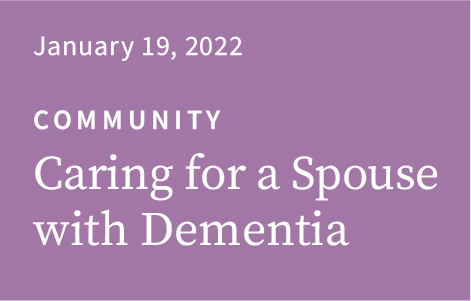Transcript
Caring for a Spouse with Dementia
In the early stages of her husband Don’s struggles with dementia, my psychotherapy client Tanya did all she could to avoid confronting him about his increasing cognitive deficits. He’d been a successful accountant and still insisted on paying their bills, even though he was no longer able to correctly write out the checks. Each month, after he’d finished, Tanya would volunteer to mail the letters with the checks, then secretly open the envelopes while he was in another room to redo all he’d done. She was afraid that if she corrected the checks in front of him, he’d feel crushed.
That story has stayed with me during my 30 years of practice as a clinical psychologist specializing in family caregiving because it captures some of the essential elements of spousal dementia caregiving: sensitivity to the dignity of the person with dementia; the need for patience, flexibility, and creativity; and the occasional well-intentioned use of white lies or even subterfuge to effectively provide protection. Caring for a loved one with dementia is often considered to be the most challenging form of family caregiving. Caring for a spouse with dementia is considered the most challenging form of dementia caregiving.
[MUSIC]
What makes spousal dementia caregiving so difficult? For spouses who have spent decades sharing their lives with a partner, the losses due to dementia are many and profound. Those spouses are usually daily witnesses to their partners’ memory problems, frustrations, and paranoia at times. As those partners lose the capacity for being empathetic because of the disease’s impact on their frontal lobes, the spouses lose their longtime confidants. Their future dreams for travel, new ventures, and comforting one another as they age are lost. Their shared past disappears when the person’s long-term memory is affected during the disease’s latter stages. Because dementia is a stigmatized disease, they lose social support as friends and even family members back away. Ultimately, they lose their partners themselves to death from dementia-related or other medical causes.
The challenges of spousal dementia caregiving can be best understood in terms of the disease’s broad stages.
In the early, mild stage of dementia, it is hard for spouses to understand their partners’ memory lapses and personality changes. I recall a psychotherapy client named Barbara who thought her husband, Tim, was falling out of love with her after 20 years together because he seemed more withdrawn and less talkative; she later understood it was the disease that was decreasing his energy and initiative. Even as spouses become aware there is something wrong, they may hold off on seeking a medical evaluation to protect their partners and themselves from a dire diagnosis. Even after the diagnosis is finally made, those spouses are often reluctant to start taking over some of their partners’ roles, such as managing the couple’s finances. They may be hard-pressed to convince their partners and family members of the reality of the diagnosis.
In the middle, moderate stage of dementia, the diagnosis is clearer because of the partners’ increasingly evident thinking difficulties. Their spouses have now been transformed into spousal dementia caregivers with greater responsibilities. During this stage, many spouses have a difficult balancing act; they are hesitant to “take over” because they don’t want to injure their partners’ dignity, but they also must ensure their safety. I recall my mother still deferring to my stepfather on money matters, long after he lacked the reasoning skills to use good financial judgment; she simply didn’t want to hurt him.
During this stage, spousal dementia caregivers are feeling acutely the loss of the relationships they once had. Most of their interactions with their partners become focused on completing care tasks, rather than enjoying one another’s company. Spousal dementia caregivers sometimes wonder if they have enough love and devotion to continue. Psychologist Polly Young-Eisendrath has written penetratingly in her spousal dementia caregiver memoir, The Present Heart, about how her love for her partner with dementia changed over time from a romantic love to “cherishing,” caring for him in a protective way based on what they’d meant to one another in the past.
In the late or severe stage, partners typically have difficulties with such activities of daily living as dressing, grooming, toileting, and feeding. It is up to spousal dementia caregivers then to either provide hands-on care with these tasks or to arrange for others, such as home health aides, to provide that support. Making the choice to use aides at home—or even to place a partner in a skilled nursing facility or dementia unit for round-the-clock care—can be excruciating if other family members object or if the spouses themselves believe their marriage vows require them to continue providing all the needed care themselves “until death do us part.”
Dealing with these challenges, year after caregiving year, takes its toll. Research finds that about half of dementia caregivers have at least mild depression. Those who are most highly stressed by caregiving tend to neglect their own physical health needs and then suffer more negative consequences of their own diabetes, high blood pressure, or other conditions.
As a psychologist counseling stressed spousal dementia caregivers, I recommend several survival strategies.
Foremost among them is a commitment to self-care. I make ample use of the stereotypical analogy of the marathon, saying that dementia caregiving is truly like a long-distance race in which caregivers must learn the terrain by reading about dementia and its treatments, run at a pace that’s sustainable, and replenish themselves at every opportunity.
For spousal dementia caregivers whose partners are in the mild stage, we talk about ways of sharing medical information with family members and friends to develop consensus about the partner’s condition and needs and to begin to recruit them as members of a caregiving team. We also discuss the importance, as psychiatrist Peter Steinglass has said, of “putting the illness in its place”—that is, not allowing dementia to become the primary focus of the relationship but instead dealing with it only as necessary and trying to preserve the couple’s mutual enjoyment of time together for as long as possible.
In the moderate stage, I help spousal dementia caregivers grieve the losses that are increasingly apparent to them and begin preparing for more losses to come. We talk a lot about their reasons for remaining devoted to their partners and the positive meanings they derive from caregiving—for instance, the chance to give back to someone they love or the opportunity to do the right and moral thing. We also talk about how to minimize the imbalanced give-and-take in their relationship now as a way of trying to hold on to some sense of mutuality between the spouse and partner. I often suggest that spouses find ways for their partners to continue to contribute to the household and help them, rather than justify doing everything that needs to be done because, as some caregivers say, “it’s just easier if I do it myself.”
In the severe stage, I counsel spousal dementia caregivers about the importance of defining limits and suggest that their responsibility is not to provide all the care themselves but to ensure that their partners are well cared for, even if by others. We talk about the importance of cherishing memories of when their partners were whole and savoring the increasingly rare instances when their partners are momentarily lucid and more like themselves again.
Spousal dementia caregiving can be grueling and often heartbreaking. Above all else, I point out to these spouses the good they’ve provided their partners simply by comforting them over the long haul. At the end, some dwell guiltily on times when they were irritable with or even angry at their partners. I am quick to remind them that they are human and are forgiven for occasionally acting imperfectly. But I tell them I hope they’ll be able to look back on their time as caregivers and judge themselves worthy for having done their best for someone they loved.
Barry J. Jacobs, PsyD
Principal
Health Management Associates
www.loveandmeaning.com

